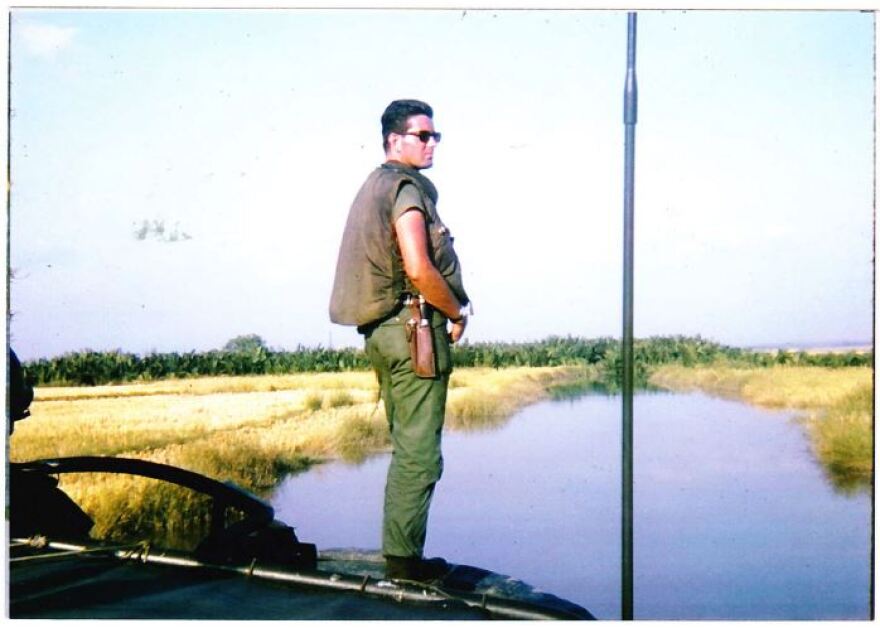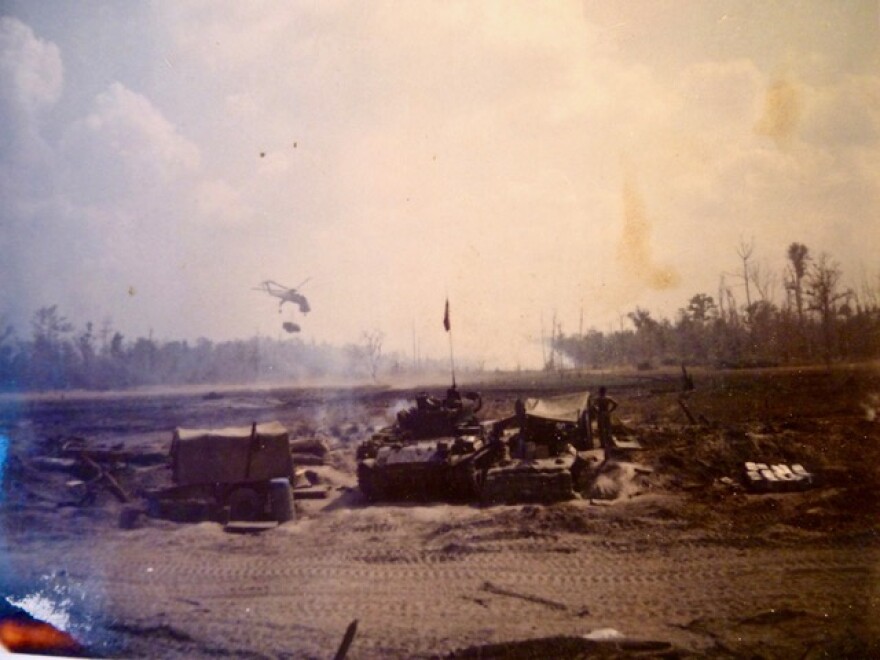For many Americans, the Vietnam War is a long, complex, and oft-misunderstood chapter of American history. But the recent ten-part documentary by filmmakers Ken Burns and Lynn Novak stirred up a national discussion about Vietnam. We speak with four veterans of the war about the documentary, and their own experiences.
(Scroll down to read the story of Natt King, another New Hampshire veteran who shared his story off the air.)
This show was originally broadcast on Oct. 17, 2017.
Program Guests

Mike Heaney
Heaney served in Vietnam in 1966 as a 2nd Lieutenant in the 1st Cavalry Division, where he fought in the central highlands of Vietnam.
Heaney appears in the Burns/Novak documentary, discussing the ambush that almost killed his platoon, and led to Operation Crazy Horse, a 20-hour battle on May 16-17, 1966. Read more about this battle at the website for the 1st Cavalry Division. He also discusses the shooting of student protesters at Kent State.
Back in the United States, Heaney practiced law for 25 years before getting a PhD in history and teaching at the college level. He returned to Vietnam in 2008. Read about this experience here.
John Donovan
Donovan served as a lieutenant, junior grade, and patrol officer for the Navy in Vietnam from 1967-1968. He ran a boat patrol in the Mekong Delta, a vast maze of rivers, swamps, and islands in southern Vietnam. During his service, he participated in 250 combat patrols and more than 50 firefights.
Donovan also worked with humanitarian organizations from the United States in Vietnam and now runs a nonprofit that builds homes there. His organization recently built ten houses in Tien Giang Province, in the Mekong Delta.
He has worked as an organizational development consultant for more than 30 years. Donovan has also worked with veterans after 9/11, helping them transition to civilian life.

John Johnson
Johnson served in Vietnam with the Naval Construction Battalion (the Seabees) from 1967-1968. The Seabees help build structures used in warfare -- fixing and constructing roads, building airstrips, and keeping vehicles running.
Johnson was a student at the N.H. Technical Institute in Manchester before he enlisted. He was in Vietnam during the Tet Offensive, several miles from combat. After returning home from the war, he worked for many years in manufacturing.
Jack Mallory

Mallory was a Captain in Vietnam in the Army's 11th Armored Cavalry from 1969-1970, where he worked in the Office of Civic Action. He says his job there was "to write propaganda."
After returning to the U.S., Mallory joined Vietnam Veterans Against The War. You can read more about the VVAW here.
Mallory is a retired university professor and former high school history teacher; he volunteers at the Manchester VA Medical Center.


Exchange Extra: N.H. Veteran Says Vietnam War Stays With Him

As a teenager living in Meredith, N.H., Natt King says he was “rather troublesome.” After shooting out some traffic lights in his town, he ended up in court before a judge, who happened to be a major in the Marine reserves.
King says his lawyer struck a deal with the judge to keep him out of jail. He would enter the Marines.
King had already been thinking about joining the military, following a marine-cousin's example. He entered boot camp in July of 1968 and distinguished himself, receiving meritorious promotions and pretty quickly rising to the rank of sergeant.
“I was gung-ho and naive,” he said in a recent phone interview. “I really thought we had a legitimate reason to be there.”
King, who is 68 and preparing to retire soon and hand on his stonework business in Moultonborough to his son, says he thinks about the war often.
For 13 months in Vietnam, he led a squad of fighters in combat. He says he saw some “uncomfortable things,” including the ways in which some Americans treated Vietnamese.
To this day, he can recall the anxious feeling of being on patrol, when a booby trap might go off or an ambush occur at any time. Still, he signed on for a six-month extension there.
“It's hard to leave the friends you've made,” he says.
As difficult as the war was, King says it was his arrival in a Los Angeles airport while on a 30-day leave that was unexpectedly upsetting, even surreal.
“I'd never had anyone call me baby-killer,” he said, referring to the name-calling some veterans experienced upon returning from the war.
“But what struck me was the apathy. I felt like grabbing people and saying 'Don't you know what's going on?’”
While on leave, he says, “a light went on.” He felt he couldn't return to the war and even considered going to Canada. That interior struggle caused him to delay checking in with his superiors and after a few days, he was considered AWOL.
At that point, he said, “I lost courage and decided I would go back.”
Back in Vietnam, he said his squad was surprised he had returned. For the remainder of his time there, he was assigned as Delta Company supply sergeant and police sergeant.
After the war, King said, he began drinking and smoking marijuana as a way to cope. But he eventually found his way to happier times. He said he's especially proud of his three children and grateful for his marriage of 40 years to a woman he’d known in high school who’d had the good sense, he said, not to have much to do with him when he was a rebellious teenager.
As for the Ken Burns Vietnam series, King says he hasn’t really learned anything especially new from the film. War remains a source of wealth for too many at the high end of society, he says.
And the film left him with a feeling of frustration – that somehow the lessons of the Vietnam war have yet to be learned, especially by those with political power.
Related Reading:
- Dialogues on War & Homecoming: A N.H. Humanities program invites veterans to attend a 10-week reading and discussion group on The Odyssey.
- PBS has a comprehensive battlefield timeline for the war available here.
- "Emotional exchanges expected after 'The Vietnam War' airs," from the Union Leader.
- The Concord Monitor has a series called "Vietnam Stories," from veterans and their families.
- "Vietnam veterans are honored, and a documentary tries to explain what happened and why," by the Concord Monitor.
- "Remembering, and Learning From, The Vietnam War," by WBUR.







